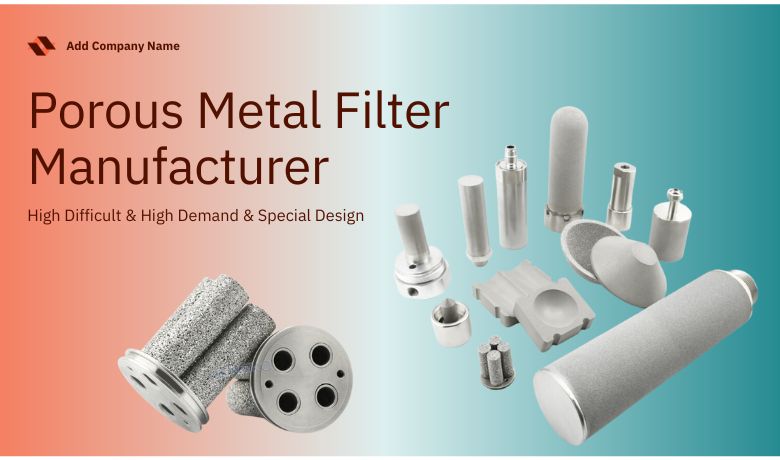-
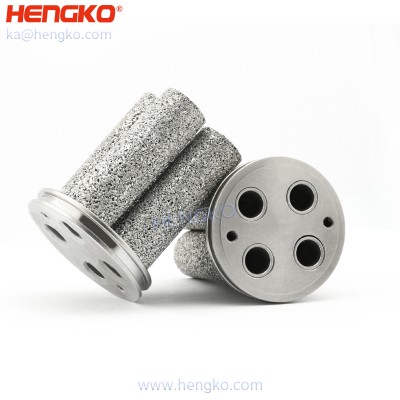
Sintered metal stainless steel porous textile filters for in high pressures enviroments...
Sintered metal stainless steel porous textile filters for in high pressures enviroments manufacture of nylon, Sintered metal stainless steel porous textile...
View Detail -
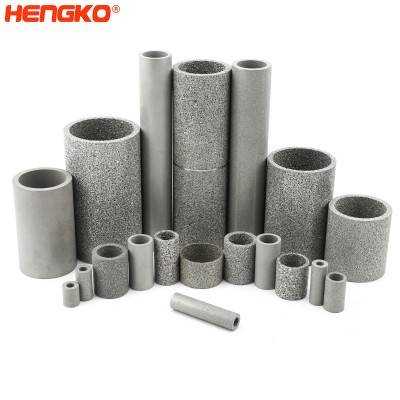
Sintered micron stainless steel porous metal filter cylinder for gas filtration
Sintered micron stainless steel porous metal filter cylinder for gas filtration, Filter Cylinder, Filter Element, Sintered Metal Filter, sintered metal fil...
View Detail -
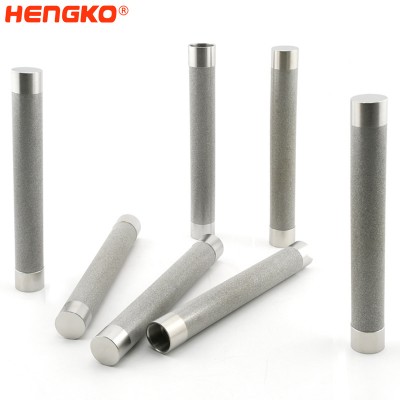
HENGKO sintered porous metal stainless steel filter for Fiber Optic Collimator
HENGKO sintered porous metal stainless steel filter for Fiber Optic Collimator, stainless steel filter,sintered porous metal stainless steel filter, porou...
View Detail -
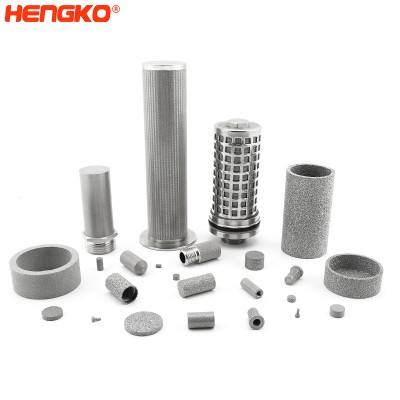
Factory For China 1 Micron Sintering Metal Porous Filter Tube Stainless Steel Mesh Sint...
We always follow the principle "Quality Very first, Prestige Supreme". We have been fully committed to delivering our customers with competitively priced hig...
View Detail -
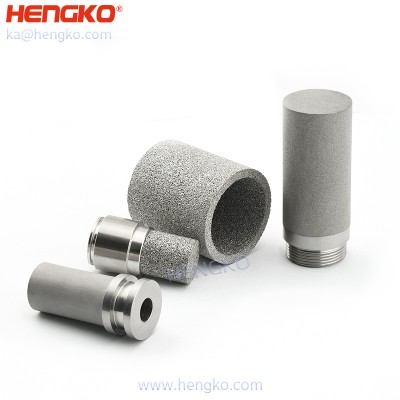
High performance porous sintered metal stainless steel isostatic filters tubes support ...
High performance porous sintered metal stainless steel isostatic filters tubes support liquid and gas applications, porous metal filter tube, sintered tube...
View Detail -

100% Original China Customized Microns Sintered Porous Metal Stainless Steel Filter Disc
Our target is to consolidate and improve the quality and service of existing products, meanwhile constantly develop new products to meet different customers'...
View Detail -

HENGKO sintered porous metal stainless steel filter for Fiber Optic Collimator
We rely upon strategic thinking, constant modernisation in all segments, technological advances and of course upon our employees that directly participate in...
View Detail -
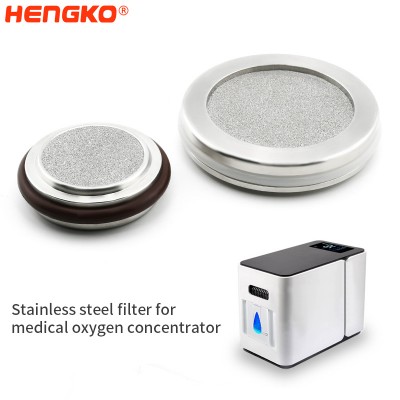
Sintered Porous Metal Stainless Steel Bacteria HEPA Filter for Medical Oxygen Concentrator
HENGKO Sintered porous metal Stainless steel bacteria HEPA filter for Medical Oxygen Concentrator adopts medical grade stainless steel material, have the ad...
View Detail -

Sintered micron stainless steel porous metal filter cylinder for gas filtration
Product Describe Sintered Metal Filter Cartridges: Porous metal filters have a wide variety of industrial filter uses. These reusable, high-quality filters a...
View Detail -
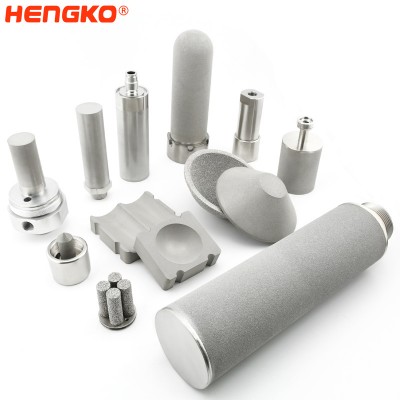
Porous Metal Powder Sintered Stainless Steel Catalyst Recovery Filters for Catalyst Rec...
A brief introduction to the working principle of catalyst filter (sintered filters) equipment: HENGKO Sintered Metal Catalyst Filter uses catalysts to recove...
View Detail -
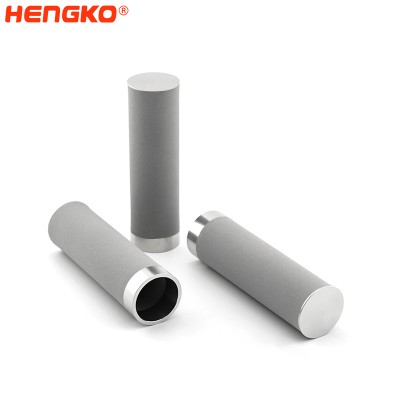
HENGKO Superior Membrane Surface Porous Sintered Metal Filter
Product Description:Upgrade your filtration efficiency and prolong the lifespan of your filters! HENGKO's sintered porous stainless steel filter product util...
View Detail -
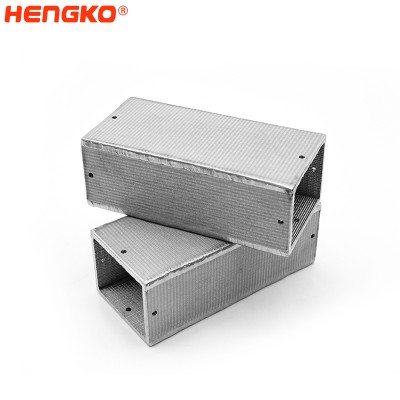
Porous Metal 316L Filter for catalytic reactions Granular Bed Filtration
Introducing the Porous Metal 316L Filter - Your One-Stop Solution for Chemical Detection! Are you tired of dealing with inefficient and complex chemical dete...
View Detail -
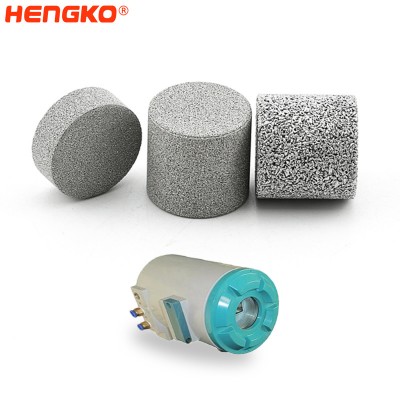
Monocrystalline silicon pressure transmitter sintered metal porous filter disc
Using single crystal silicon piezoresistive technology pressure sensor, process industry liquid level measurement applications sintered filter disc material:...
View Detail -
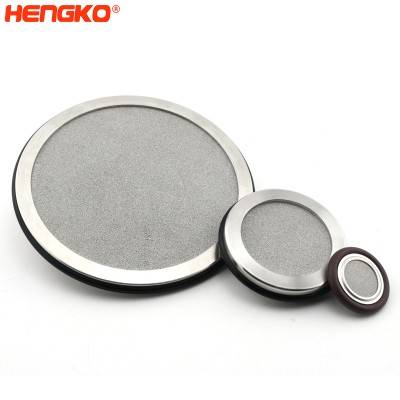
Porous sintered metal filter of ozone and air in water
The manufacturing process of large diameter (80-300 mm) discs of sintered stainless and corrosion-resistant steels is described. The characteristics of the i...
View Detail -

Sintered Porous Metal Leaf Disc Filter For the Polymer Melt Industry
Leaf Disc and Solid Plate Filters for critical hot melt polymer filtration applications. Leaf disc and solid plate filters are designed for critical h...
View Detail -
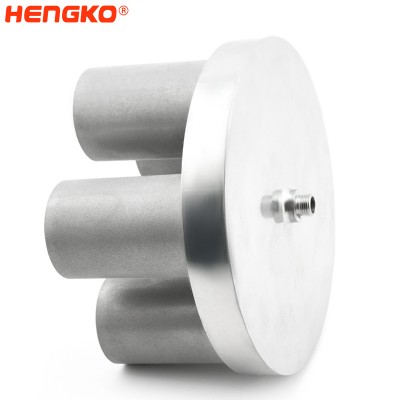
Porous Metal Filter Media and OEM Sintered Stainless Steel Filter for Hydrogen Gas
The porous metal filter media of the present invention includes a filtering unit which removes impurities from hydrogen gas, and a one-way control valve whi...
View Detail -
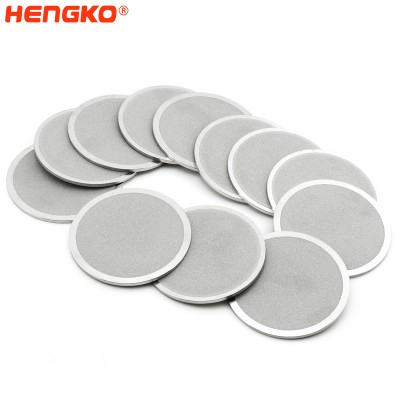
Sintered porous metal filter disc 20 micron for Gas purification and analysis
Achieve Unparalleled Gas/Solids Separation with HENGKO's Sintered Stainless Steel Filter Discs! Our filtration systems, featuring sintered stainless ...
View Detail -
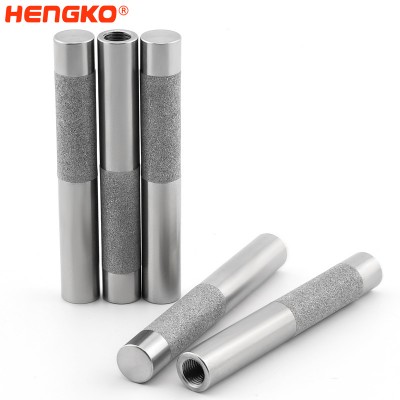
OEM Fiber Collimator Diameter 7mm Fiber Porous Metal Stainless Steel Filter
This product can be used for fiber collimation or for coupling focusing. The use of collimation, either single mode or multimode fiber can be used. If used a...
View Detail -
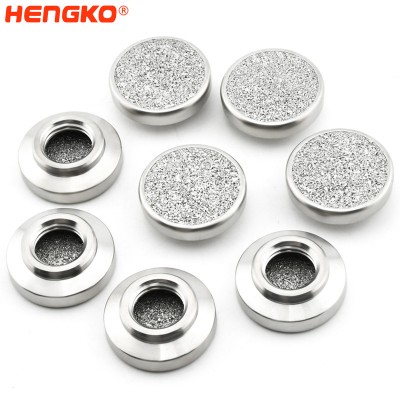
Stainless Steel Exhausts – Porous Metal Filter Muffler
Silencer / Filter made of porous metal Small silencers / filters made of porous metal with many applications. It reduces noise and is designed for selective ...
View Detail -
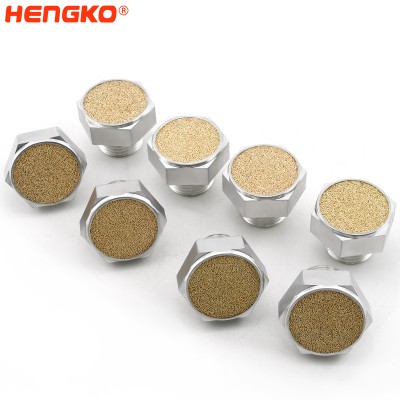
Porous Metal Muffler Filter Exhaust Pneumatic Solenoid Valve
ECONOMICAL CHOICE FOR MANY FILTERING AND MUFFLING SCENARIOS Filter-Mufflers have selective permeability with optimum filtering and diffusion for air ...
View Detail
Types of Porous Metal Filter
Porous metal filters are made by compressing and sintering metal powders to create a rigid structure with interconnected pores.
They are highly efficient at removing contaminants and impurities from liquids and gases, and are used in a wide range of
industrial and commercial applications.
There are many different types of porous metal filters available, classified by the type of metal used, the pore size, and the filter geometry.
Some of the most common types of porous metal filters include:
1. Stainless Steel Sintered Filters
Stainless steel sintered filters are the most common type of porous metal filter, and are used in a wide range of
applications due to their excellent corrosion resistance, high temperature tolerance, and mechanical strength.
Stainless steel sintered filters can be made with a wide range of pore sizes, from a few microns to several
millimeters, making them suitable for a variety of filtration applications.
2. Bronze Sintered Filters
Bronze sintered filters are another common type of porous metal filter, and are known for their high strength,
durability, and resistance to corrosion and wear. Bronze sintered filters are often used in applications where
high temperature resistance is required, such as in fluidized beds, chemical processing, and high-temperature filtration.
3. Titanium Sintered Filters
Titanium sintered filters offer the highest level of corrosion resistance of any type of porous metal filter,
and are also biocompatible, making them suitable for use in medical, pharmaceutical, and food processing
applications. Titanium sintered filters are also very strong and durable, and can be used in a variety of demanding environments.
4. Nickel Sintered Filters
Nickel sintered filters are used in a variety of applications where high purity and corrosion resistance
are required. Nickel sintered filters are also very strong and durable, and can be used in a variety of
demanding environments.
5. Other Porous Metal Filters
In addition to stainless steel, bronze, titanium, and nickel sintered filters, there are a variety of other
porous metal filters available, made from materials such as copper, Hastelloy, and Inconel. These filters
are often used in specialized applications where their unique properties are required.
6. Filter Geometry
Porous metal filters can be manufactured in a variety of geometries, including:
* Cylindrical filters
* Cartridge filters
* Disc filters
* Leaf filters
* Tube filters
* Plate filters
* Custom filters
The filter geometry is selected based on the specific application requirements, such as the
flow rate, the pressure drop, and the type of contaminants being removed.
Porous metal filters are an essential component in many industrial and commercial applications.
They offer a variety of advantages over other types of filters, including:
* High filtration efficiency
* Excellent durability
* Good corrosion resistance
* High temperature tolerance
* Wide range of pore sizes available
* Reusable and cleanable
Porous metal filters are used in a wide range of applications, including:
* Chemical processing
* Food and beverage processing
* Pharmaceutical manufacturing
* Medical device manufacturing
* Semiconductor manufacturing
* Aerospace and defense
* Automotive
* Oil and gas
* Water and wastewater treatment
* Environmental protection
Porous metal filters are a versatile and effective filtration solution for a wide range of applications.
Main Features of Porous Metal Filter
The main features of porous metal filters are:
* High filtration efficiency: Porous metal filters can remove a wide range of contaminants and impurities from liquids
and gases, including solids, bacteria, and viruses.
* Excellent durability: Porous metal filters are very strong and durable, and can withstand high pressures and
temperatures.
* Good corrosion resistance: Porous metal filters are available in a variety of materials, including stainless
steel, bronze, titanium, and nickel, which offer excellent corrosion resistance to a wide range of chemicals
and environments.
* High temperature tolerance: Porous metal filters can be used in high temperature applications, up to several
hundred degrees Celsius.
* Wide range of pore sizes available: Porous metal filters can be manufactured with a wide range of pore sizes,
from a few microns to several millimeters, making them suitable for a variety of filtration applications.
* Reusable and cleanable: Porous metal filters are reusable and cleanable, which can save money on
filter replacement costs.
In addition to these main features, porous metal filters also offer a number of
other advantages, such as:
* High filtration efficiency: Porous metal filters can remove a wide range of contaminants and impurities
from liquids and gases, including solids, bacteria, and viruses.
* Excellent durability: Porous metal filters are very strong and durable, and can withstand high pressures
and temperatures.
* Good corrosion resistance: Porous metal filters are available in a variety of materials, including stainless
steel, bronze, titanium,
and nickel, which offer excellent corrosion resistance to a wide range of chemicals and environments.
* High temperature tolerance: Porous metal filters can be used in high temperature applications, up to
several hundred degrees Celsius.
* Wide range of pore sizes available: Porous metal filters can be manufactured with a wide range of pore
sizes, from a few microns to several millimeters, making them suitable for a variety of filtration applications.
Reusable and cleanable: Porous metal filters are reusable and cleanable, which can save money on
filter replacement costs.
Overall, porous metal filters are a versatile and effective filtration solution for a wide range of applications.
They offer a combination of high filtration efficiency, durability, corrosion resistance, and temperature tolerance,
making them a popular choice for many industries.
How to Choose Right Porous Metal Filter for
different filtration application
The specific porous metal filter that is right for a particular filtration application will depend on a variety of factors, including:
* The type of fluid or gas being filtered
* The size and concentration of the particles to be removed
* The desired flow rate
* The operating temperature and pressure
* The chemical compatibility of the filter material with the fluid or gas being filtered
* The cost of the filter element
Some common porous metal filter applications include:
* Liquid filtration:
Porous metal filters can be used to filter a wide range of liquids, including water,
oil, chemicals, and food products. For example, porous metal filters are used in water treatment
plants to remove bacteria and other contaminants from drinking water. They are also used in oil
refineries to remove impurities from crude oil.
* Gas filtration:
Porous metal filters can also be used to filter gases, such as air, nitrogen, and
hydrogen. For example, porous metal filters are used in air compressors to remove dust and
other particles from the air. They are also used in semiconductor manufacturing to remove
contaminants from the gases used to etch and deposit thin films on silicon wafers.
Here are some specific examples of how to choose the right porous metal filter
for different filtration applications:
* Water filtration:
For water filtration, it is important to choose a filter material that is resistant to corrosion and chemical attack. Stainless steel is a good choice for most water filtration applications. However, if the water is highly acidic or corrosive, a more resistant material such as titanium may be required. The pore size of the filter element should be selected based on the size of the particles to be removed. For example, a filter element with a pore size of 10 microns will remove particles that are larger than 10 microns in diameter.
* Oil filtration:
For oil filtration, it is important to choose a filter material that is compatible with the type of oil being filtered. For example, bronze is a good choice for filtering petroleum-based oils. However, stainless steel is a better choice for filtering synthetic oils. The pore size of the filter element should be selected based on the size of the particles to be removed and the desired flow rate.
* Chemical filtration:
For chemical filtration, it is important to choose a filter material that is compatible with the chemicals being filtered. For example, stainless steel is a good choice for filtering most acids and bases. However, titanium or nickel may be required for filtering more aggressive chemicals. The pore size of the filter element should be selected based on the size of the particles to be removed and the desired flow rate.
* Air filtration:
For air filtration, it is important to choose a filter material that is efficient at removing the type of particles to be removed. For example, a HEPA filter is required to remove very small particles, such as pollen and dust mites. The pore size of the filter element should be selected based on the size of the particles to be removed and the desired flow rate.
If you are unsure which porous metal filter is right for your specific application, it is best to consult with a qualified expert. They can help you to assess your needs and choose the best filter element for your system.
Applications of Porous Metal Filter
Porous metal filters are used in a wide range of applications, including:
* Food and beverage processing:
Porous metal filters are used to filter a variety of food and beverage products, including water,
milk, beer, wine, and juices. They are also used to remove impurities from cooking oils and other fats.
* Pharmaceutical manufacturing:
Porous metal filters are used to filter sterile fluids and to remove contaminants from pharmaceutical products.
They are also used to sterilize air and gases in cleanrooms and other controlled environments.
* Chemical processing:
Porous metal filters are used to filter a variety of chemicals, including acids, bases, solvents, and oils.
They are also used to remove impurities from catalysts and other process materials.
* Petroleum refining:
Porous metal filters are used to filter crude oil and petroleum products, such as gasoline, diesel fuel,
and jet fuel. They are also used to remove impurities from catalysts and other process materials.
* Water and wastewater treatment:
Porous metal filters are used to remove bacteria, viruses, and other contaminants from drinking water
and wastewater. They are also used to filter industrial wastewater to remove pollutants before they are discharged into the environment.
* Power generation:
Porous metal filters are used to filter water, steam, and other fluids in power plants. They are also
used to filter air to remove dust and other particles before it is used to cool the plant's equipment.
* Aerospace and defense:
Porous metal filters are used to filter fuels, hydraulic fluids, and other fluids in aircraft and spacecraft.
They are also used to filter air to remove contaminants before it is used to cool the aircraft's or spacecraft's equipment.
* Automotive:
Porous metal filters are used to filter fuel, oil, and other fluids in automobiles. They are also used to filter
air to remove dust and other particles before it enters the engine.
In addition to these general applications, porous metal filters are also used in a variety of specialized applications, such as:
* Medical device manufacturing:
Porous metal filters are used to filter blood and other fluids in medical devices, such as dialysis machines and heart-lung machines.
* Semiconductor manufacturing:
Porous metal filters are used to filter the gases used to etch and deposit thin films on silicon wafers.
* Environmental protection:
Porous metal filters are used to filter emissions from industrial plants and to remove pollutants from air and water.
Porous metal filters are a versatile and effective filtration solution for a wide range of applications. They offer a combination of high filtration efficiency, durability, corrosion resistance, and temperature tolerance, making them a popular choice for many industries.
What You Should Care or Show to Manufacturer
When OEM Porous Metal Filter ?
When OEM porous metal filters, there are a number of things that you should care about or show to the manufacturer, including:
* Filtration requirements:
What size of particles do you need to filter out? What is the maximum flow rate that your filter needs to handle?
What is the operating temperature and pressure of your system?
* Material selection:
What type of material is best suited for your application?
Consider the corrosive environment, temperature, and pressure requirements.
* Shape and size:
What shape and size filter element do you need?
Consider the space constraints in your system and the required flow rate.
* Certification and standards:
Are there any specific certifications or standards that your filter element must meet?
* Testing and quality control:
What kind of testing and quality control procedures does the manufacturer have in place?
Here is a more detailed explanation of each factor:
1. Filtration requirements
The first step in OEM porous metal filters is to determine your filtration requirements. What size of particles do you need to filter out? What is the maximum flow rate that your filter needs to handle? What is the operating temperature and pressure of your system?
Once you know your filtration requirements, you can start to work with the manufacturer to develop a filter element that meets your needs. The manufacturer will be able to recommend specific materials and designs based on your requirements.
2. Material selection
The type of material used to make the porous metal filter is important to consider. Some common materials include stainless steel, bronze, titanium, and nickel. Each material has its own unique properties, such as corrosion resistance, temperature tolerance, and strength.
For example, stainless steel is a good choice for applications where corrosion resistance is important. Bronze is a good choice for applications where high temperature resistance is required. Titanium is a good choice for applications where biocompatibility is required. And nickel is a good choice for applications where high purity and corrosion resistance are required.
3. Shape and size
Porous metal filters can be manufactured in a variety of shapes and sizes. The most common shapes are cylindrical, cartridge, disc, leaf, tube, and plate filters. Custom filters can also be manufactured to meet specific application requirements.
The shape and size of the filter element will depend on the space constraints in your system and the required flow rate. For example, if you have limited space, you may need to choose a cylindrical filter element. If you need a high flow rate, you may need to choose a cartridge filter element.
4. Certification and standards
Some industries have specific certification or standards requirements for porous metal filters. For example, the food and beverage industry may require filters to be FDA-approved. And the medical industry may require filters to be ISO 13485 certified.
If you are unsure whether any certification or standards requirements apply to your application, it is best to consult with your industry association or a qualified expert.
5. Testing and quality control
It is important to choose a manufacturer that has a good reputation for quality and that uses rigorous testing procedures. The manufacturer should be able to provide you with test results that demonstrate that the filter element meets your requirements.
In addition to the above factors, you may also want to consider the following when OEM porous metal filters:
* Lead time: How long will it take the manufacturer to produce and deliver the filter element?
* Cost: How much does the filter element cost?
* Warranty and support: Does the manufacturer offer a warranty on the filter element? What kind of technical support do they offer?
By carefully considering all of these factors, you can choose the right manufacturer and develop a porous metal filter that meets your specific needs
